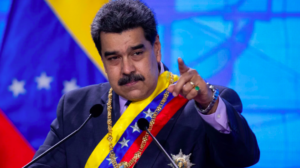
As the US and Venezuela begin to engage on the topic of sanctions, there needs to be a clear consensus around the topic of sanctions: they are inhumane. Historically, from Iraq to Cuba to Venezuela, sanctions have primarily affected civilian populations on the premise that these would encourage the community to revolt against their leadership. In Special Operations parlance, the idea is to drain ocean of ‘fish’ within which opposition swims and make the cumulative cost be so dire that civilians do not distinguish between their leadership and foreign aggression.
However, in many countries and stateless territories, civilians have not been open to the idea of US sanctions being the sole determinant of their political future. Thus, a continuous push with sanctions, military intervention and international political obstructionism plagues their political geography. Civilians pay the cost while their leadership maneuvers into, perhaps, more extreme positions that are meant to counter US aggression.
Region Caught by Surprise
Currently, the idea is that the United States will allow Venezuela a return to international oil markets, denominated in US dollars mostly, in exchange for free elections in 2024. Of course, the premise here is that Venezuela never had free elections and that opposition forces were wrongly oppressed. However, nothing can be further from the truth: both Leopoldo Lopez and Juan Guaido have had their limited political relevance questioned by both lack of public support and gaffes that link them to politicized drug traffickers in Colombia.
The region’s other leadership has been caught by surprise suggesting that the negotiations were kept a secret, and had not been definitive, for some time. Brazil’s Luiz Inacio de Lula phoned Nicolas Maduro for additional information on the US-Venezuela negotiations in the past 12 hours. Fundamentally, the lifting of sanctions was inevitable not out of concerns for civilians, but for a multitude of factors that make lifting them the least expensive and consequential action for US authorities.
For one, US officials are dealing with Venezuelans crossing the border at the Tamaulipas-Texas and Sonora-Arizona points in addition to the Rio Grande due to the lack of fear and desperation around their economic situation. Most Venezuelans are fleeing in masse due to a collapsed labor economy and diminishing healthcare. In some cases, diseases that were formerly eradicated are returning due to the lack of inoculation funding.
Worse still, from the perspective of the US Government, working age males are not the only ones crossing the border, but also infants and elderly people, who are unlikely to follow the preceding and usual pattern of working age males migrating into the US in order to contribute more into the economy than what they receive in social services. In fact, this is the opposite dynamic in an already delicate American economy.
Additionally, oil price increases due to the Russia-Ukraine war have made US policy planners keen on reaching out to Venezuela for their vast reserves of oil. The ever-escalating Israel-Hamas/Israel-Hamas, Lebanon, Iran conflict was likely the nail on the coffin for gun-ho and cruel US sanctions on Venezuela.





1 thought on “Sanctions Need to Be Lifted Unconditionally Against Venezuela”